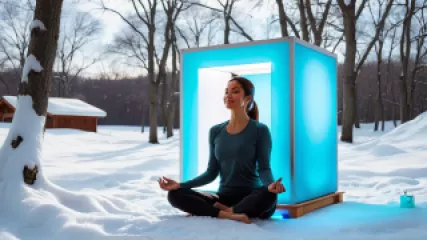How can I improve my mood with SAD self-help strategies?
Seasonal Affective Disorder (SAD) is a type of depression that occurs during specific seasons, typically winter. People with SAD experience symptoms such as low mood, lack of energy, and changes in sleep patterns. If you're looking for ways to improve your mood and manage SAD, self-help strategies can be a valuable addition to your treatment plan. In this article, we will explore various self-help techniques that can help alleviate SAD symptoms and enhance your overall well-being.
1. Light Therapy
Light therapy is a widely recognized and effective treatment for SAD. It involves sitting near a light therapy box that emits bright light, mimicking natural outdoor light. The light box helps regulate your body's internal clock and reduces symptoms of SAD.
To incorporate light therapy into your self-help routine, it's important to:
- Use a light box that emits at least 10,000 lux of light intensity.
- Sit in front of the light box for about 20-30 minutes each morning.
- Keep the light box at a distance of about 16-24 inches from your face.
- Avoid looking directly at the light; instead, position it slightly to the side.
Light therapy can help regulate your circadian rhythm and boost serotonin levels, leading to improved mood and reduced SAD symptoms.
2. Get Moving
Regular exercise has been shown to have a positive impact on mental health, including reducing symptoms of depression. Engaging in physical activity can increase endorphin release, improve sleep quality, and boost overall well-being.
Consider incorporating the following activities into your daily routine:
- Outdoor walks or runs during daylight hours to maximize exposure to natural light.
- Indoor exercises such as yoga, Pilates, or strength training.
- Group fitness classes or joining a sports team for social interaction.
Choose activities that you enjoy and can maintain consistently. Aim for at least 30 minutes of moderate-intensity exercise most days of the week.
3. Practice Mindfulness and Relaxation Techniques
Mindfulness and relaxation techniques can help reduce stress, enhance self-awareness, and improve mood. These practices encourage focusing on the present moment, accepting it without judgment, and cultivating a sense of calm.
Consider incorporating the following techniques into your daily routine:
- Meditation: Set aside time each day to sit quietly and focus on your breath or a specific object.
- Deep breathing exercises: Take slow, deep breaths, focusing on filling your belly with air and slowly exhaling.
- Progressive muscle relaxation: Tense and relax each muscle group in your body, starting from your toes and working your way up to your head.
- Yoga or tai chi: Engage in gentle movements combined with deep breathing to promote relaxation and mind-body connection.
Practicing mindfulness and relaxation techniques regularly can help reduce anxiety, elevate mood, and improve overall well-being.
4. Maintain a Healthy Lifestyle
Adopting healthy lifestyle habits can significantly impact your mood and overall mental health. Consider the following self-help strategies:
- Eat a balanced diet: Include nutrient-rich foods, such as fruits, vegetables, whole grains, and lean proteins, in your meals. Avoid excessive sugar and processed foods, as they can negatively affect mood.
- Stay hydrated: Drink enough water throughout the day to support your body's functions and promote optimal brain health.
- Get sufficient sleep: Aim for 7-9 hours of quality sleep each night. Establish a bedtime routine and create a sleep-friendly environment.
- Avoid alcohol and drugs: Substance use can worsen symptoms of depression and interfere with treatment.
Maintaining a healthy lifestyle can complement other self-help strategies and contribute to improved mood and overall well-being.
5. Seek Social Support
Connecting with others and seeking social support is crucial when dealing with SAD. Isolation and withdrawal can exacerbate symptoms of depression. Consider the following ways to maintain social connections:
- Reach out to friends and family: Schedule regular phone calls, video chats, or meetups with loved ones.
- Join support groups: Look for local or online support groups specifically for individuals with SAD or depression.
- Engage in social activities: Participate in hobbies, clubs, or community events that interest you and allow for social interaction.
Building and maintaining social connections can provide emotional support, reduce feelings of loneliness, and improve your mood.
6. Monitor Your Thoughts
Thought patterns can significantly impact your mood and well-being. Negative thinking often accompanies depression and can perpetuate feelings of sadness and hopelessness. Learning to identify and challenge negative thoughts can be an effective self-help strategy.
Consider utilizing the following techniques:
- Journaling: Write down your thoughts and emotions daily. Reflect on any negative patterns or cognitive distortions.
- Positive affirmations: Repeat positive statements to yourself, focusing on your strengths and achievements.
- Cognitive-behavioral therapy (CBT): Explore self-help CBT resources or consider working with a therapist specialized in CBT techniques.
By monitoring your thoughts and challenging negative patterns, you can develop a more positive and realistic outlook, leading to improved mood and well-being.
Conclusion
SAD self-help strategies can play a significant role in managing symptoms and improving overall mood during the winter months. Incorporating light therapy, exercise, mindfulness practices, healthy lifestyle habits, social support, and monitoring your thoughts can enhance your well-being and help alleviate SAD symptoms.
If your symptoms persist or worsen, it's essential to seek professional help from a qualified therapist or healthcare provider. They can provide additional guidance and support tailored to your specific needs. Remember, you are not alone, and there are resources available to assist you on your journey towards improved mental health.






